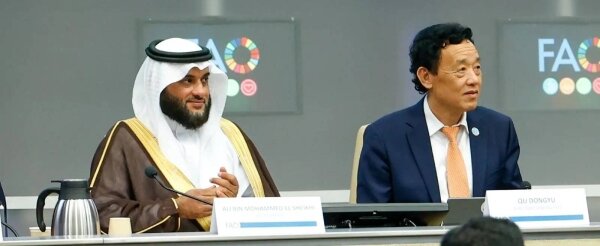
Saudi Arabia Concludes Presidency of International Year of Camelids 2024 at FAO Headquarters
The global event marked the culmination of a year-long initiative dedicated to highlighting the importance of camelids in enhancing food security, economic development, and cultural heritage across more than 90 countries.
Rome — Saudi Arabia has concluded its presidency of the International Year of Camelids 2024 at the United Nations Food and Agriculture Organization (FAO) headquarters in Rome, Italy.
The ceremony marking the conclusion took place on Tuesday and was attended by senior officials, representatives of member states, and international organizations.
The initiative, launched by the FAO, aimed to highlight the camel's cultural and social heritage as well as its vital economic role in the lives of many communities around the world.
Saudi Arabia reaffirmed its commitment to leveraging this occasion to raise global awareness of camels and promote further research and development.
Inaugurated under Saudi Arabia’s presidency in June 2024, the International Year of Camelids was a partnership with Latin American and Caribbean countries led by Bolivia.
During the ceremony in Rome, Dr. Ali Alshaikhi from Saudi Arabia's Ministry of Environment, Water and Agriculture emphasized the Kingdom's dedication to advancing recognition of camels as crucial food sources, economic assets, and cultural symbols.
Saudi Arabia organized more than 50 local and international events, including research grants and strategic meetings during its presidency.
The Kingdom also held 20 international exhibitions across various countries to raise global awareness of the importance of camels in communities worldwide.
This included an exhibition at the FAO headquarters in Rome and another at the United Nations in Geneva.
Dr. Alshaikhi noted that the International Year of Camelids served as a unique opportunity to strengthen cultural understanding, enhance food security, and promote economic development.
The Kingdom invested over SR1 billion in these efforts and is recognized for its leadership in agriculture and food security, with an ambitious strategic vision focused on sustainable production and innovation.
The ceremony marking the conclusion took place on Tuesday and was attended by senior officials, representatives of member states, and international organizations.
The initiative, launched by the FAO, aimed to highlight the camel's cultural and social heritage as well as its vital economic role in the lives of many communities around the world.
Saudi Arabia reaffirmed its commitment to leveraging this occasion to raise global awareness of camels and promote further research and development.
Inaugurated under Saudi Arabia’s presidency in June 2024, the International Year of Camelids was a partnership with Latin American and Caribbean countries led by Bolivia.
During the ceremony in Rome, Dr. Ali Alshaikhi from Saudi Arabia's Ministry of Environment, Water and Agriculture emphasized the Kingdom's dedication to advancing recognition of camels as crucial food sources, economic assets, and cultural symbols.
Saudi Arabia organized more than 50 local and international events, including research grants and strategic meetings during its presidency.
The Kingdom also held 20 international exhibitions across various countries to raise global awareness of the importance of camels in communities worldwide.
This included an exhibition at the FAO headquarters in Rome and another at the United Nations in Geneva.
Dr. Alshaikhi noted that the International Year of Camelids served as a unique opportunity to strengthen cultural understanding, enhance food security, and promote economic development.
The Kingdom invested over SR1 billion in these efforts and is recognized for its leadership in agriculture and food security, with an ambitious strategic vision focused on sustainable production and innovation.